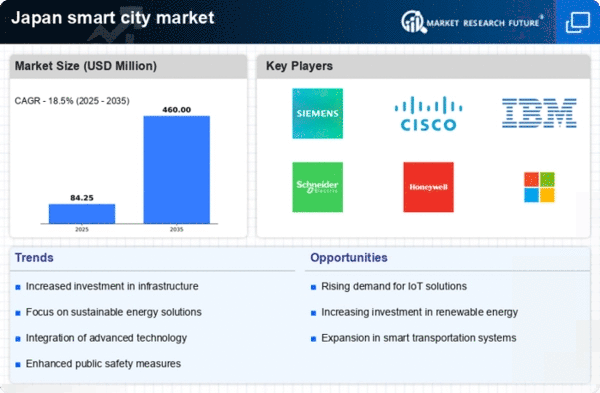Rising Urbanization
Japan is experiencing a significant trend of urbanization, with over 91% of its population residing in urban areas. This rapid urban growth drives the demand for smart city solutions to address challenges such as traffic congestion, waste management, and energy efficiency. The smart city market is likely to expand as cities implement advanced technologies to improve urban living conditions. For instance, the integration of smart grids and intelligent transportation systems can enhance resource management and reduce environmental impact. As urban areas continue to grow, the need for innovative solutions becomes increasingly critical, suggesting a robust future for the smart city market in Japan.
Technological Advancements
Technological advancements play a crucial role in shaping the smart city market in Japan. Innovations in artificial intelligence, big data analytics, and the Internet of Things (IoT) are transforming urban environments. These technologies enable cities to optimize resource allocation, enhance public safety, and improve overall efficiency. For example, the implementation of smart traffic management systems can reduce congestion by up to 30%, significantly improving urban mobility. As technology continues to evolve, the smart city market is expected to benefit from increased investment in research and development, leading to more sophisticated solutions that cater to the unique needs of Japanese cities.
Public Awareness and Engagement
Public awareness and engagement are vital drivers of the smart city market in Japan. As citizens become more informed about the benefits of smart technologies, their demand for improved urban services increases. Initiatives aimed at educating the public about smart city solutions have gained traction, fostering a culture of participation and collaboration. This heightened awareness encourages local governments to prioritize smart city projects, as they seek to meet the expectations of their constituents. Moreover, community involvement in the planning and implementation of smart solutions can lead to more effective and tailored outcomes, ultimately enhancing the overall success of the smart city market.
Environmental Sustainability Goals
Japan's commitment to environmental sustainability significantly influences the smart city market. The government has set ambitious targets to reduce greenhouse gas emissions by 26% by 2030, which necessitates the adoption of smart technologies. The integration of renewable energy sources, energy-efficient buildings, and sustainable transportation systems are essential components of this strategy. As cities strive to meet these environmental goals, the smart city market is likely to see increased investment in green technologies. This focus on sustainability not only addresses climate change but also enhances the quality of life for residents, making it a pivotal driver for the future of the smart city market.
Government Initiatives and Funding
The Japanese government actively promotes the smart city market through various initiatives and funding programs. With a focus on enhancing urban infrastructure, the government has allocated approximately ¥1 trillion to support smart city projects. This financial backing aims to foster innovation in technology and improve the quality of life for citizens. The smart city market in Japan is expected to grow as local governments collaborate with the private sector to implement smart solutions. These initiatives not only enhance urban living but also create job opportunities, thereby stimulating economic growth. Furthermore, the government's commitment to achieving carbon neutrality by 2050 aligns with the smart city market's objectives, as it encourages the adoption of sustainable technologies and practices.















